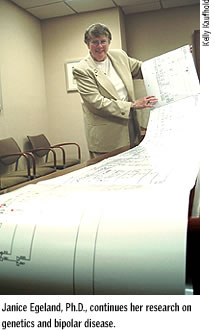 A
decades-long investigation to unlock genetic clues to
bipolar disorder continues to maintain
its momentum. Directed by Janice
Egeland, Ph.D., professor emerita in the Department of Psychiatry
and Behavioral Sciences, the “Genetic and Epidemiologic Study
of Major Affective Disorders among Old Order Amish” is
searching for a susceptibility and/or protective gene(s) for
this devastating
mental illness. A
decades-long investigation to unlock genetic clues to
bipolar disorder continues to maintain
its momentum. Directed by Janice
Egeland, Ph.D., professor emerita in the Department of Psychiatry
and Behavioral Sciences, the “Genetic and Epidemiologic Study
of Major Affective Disorders among Old Order Amish” is
searching for a susceptibility and/or protective gene(s) for
this devastating
mental illness.
In 1987 Egeland and colleagues reported
in Nature the possible location of DNA markers predisposing
individuals to bipolar affective
disorders in a large Amish pedigree. This launched the first
use of DNA technology to study a common mental disorder
and heralded
a new direction for psychiatric genetics.
“Although replication failed, our next step was to ascertain
more patients and type more informative markers. We expanded the
sample
by three new multigenerational families. Recently, my bipolar cell
collection was genotyped at Myriad Genetics, using 10,000 SNPs
(single nucleotide polymorphisms) per subject, or 4 million SNP
genotypes for 400 Amish bipolar patients and relatives,” explains
Egeland. SNPs represent variations in DNA that help identify multiple
genes associated with complex diseases.
“The genetic work pioneered by the
Amish study was 20 years ahead of the field. Finally
genetic technology is catching up to locate
the genes involved,” says Julio Licinio, M.D., professor
and chairman of the Department of Psychiatry and Behavioral Sciences.
|